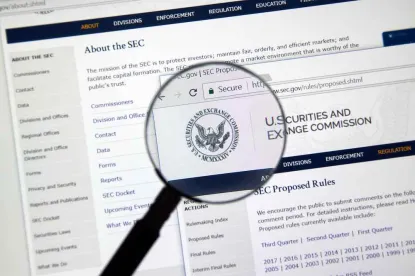In our previous post, Under Armour Inc. Pulls Sales Forward, SEC and Stockholders Push Back, we discussed Under Armour Inc.’s recent settlement with the SEC, under which Under Armour agreed to pay $9 million for alleged violations of federal securities laws. While that settlement marked the end of a two year investigation into Under Armour’s “pull forward” practices, it also was the basis on which a U.S. District Court permitted similar (but not identical) shareholder claims against Under Armour to proceed.
A U.S. District Court for the District of Maryland recently denied a motion to dismiss claims that Under Armour violated federal securities laws by overstating the level of demand for its products. While a complaint’s sufficiency is typically constrained by its well-pleaded allegations, there are exceptions. Here, the court did not base its ruling entirely on the complaint’s strength. Rather, at the shareholders’ urging, the court also took “judicial notice” of the SEC investigation and gave great weight to it.
In the shareholder action, plaintiffs alleged Under Armour misled them by falsely claiming that consumer demand for the company’s products was strong between the third quarter of 2015 and the fourth quarter of 2016. Specifically, plaintiffs alleged (among other things) Under Armour improperly “pulled forward” its sales from future quarters, creating the false appearance that the company’s year-over-year revenue growth was “safely intact” in violation of Sections 10(b) and 20(a) of the Securities Exchange Act of 1934 and SEC Rule 10b-5.
Under Armour moved to dismiss, arguing that the shareholders failed to adequately plead its statements were false as required under applicable law or that it had acted with the requisite scienter. But before the court ruled on that motion, the SEC entered an order instituting cease-and-desist proceedings. The plaintiffs then filed correspondence with the court supplementing their opposition motion and asking the court to take judicial notice of the SEC order.
As a threshold matter, the court explained that, under Rule 201 of the Federal Rules of Evidence, courts may take “judicial notice” of relevant facts that are not “subject to reasonable dispute” when such facts “can be accurately and readily determined from sources whose accuracy cannot reasonably be questioned.” The court then determined that “there is no dispute with respect to the accuracy of the SEC Order,” adding that shareholders cited “numerous examples of cases in which courts have taken judicial notice of similar SEC cease and desist orders.” And, for those reasons, the court concluded that taking judicial notice of the SEC order was “permissible and appropriate.”
Importantly, the court took judicial notice of the SEC order even though Under Armour neither admitted nor denied the SEC’s findings. The court also made two other notable observations.
-
First, the court relied on the SEC order to deny the motion to dismiss even though the legal issues in the two cases were not identical. Unlike the Section 10(b) claim that plaintiffs brought in the civil action, the statutes under which the SEC charged Under Armour did not require the SEC to plead and prove scienter and the SEC order thus contained no findings on that issue. Yet, the court determined the SEC order included enough specific allegations to support a “strong inference” of scienter.
-
Second, the court held the SEC order would not provide “dispositive evidence” in the case. Rather, the court ruled the order merely “lends support” to the allegations in the complaint because it “provides specific factual allegations” regarding Under Armour’s pull forward practices and the impact on investors, and was therefore sufficient for the court to deny Under Armour’s motion to dismiss.
While further proceedings will ultimately determine whether Under Armour’s allegedly improper practices violated federal securities laws, the Maryland District Court’s ruling makes clear that SEC orders and settlements—even those in which a defendant denies the SEC’s claims and which involve statutes containing different elements than in parallel or subsequent private civil cases—may provide a powerful tool for private plaintiffs in securities actions.


 />i
/>i
